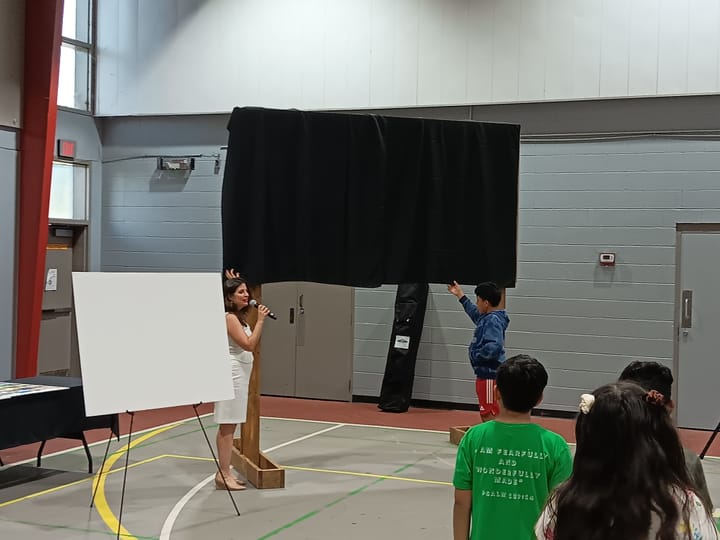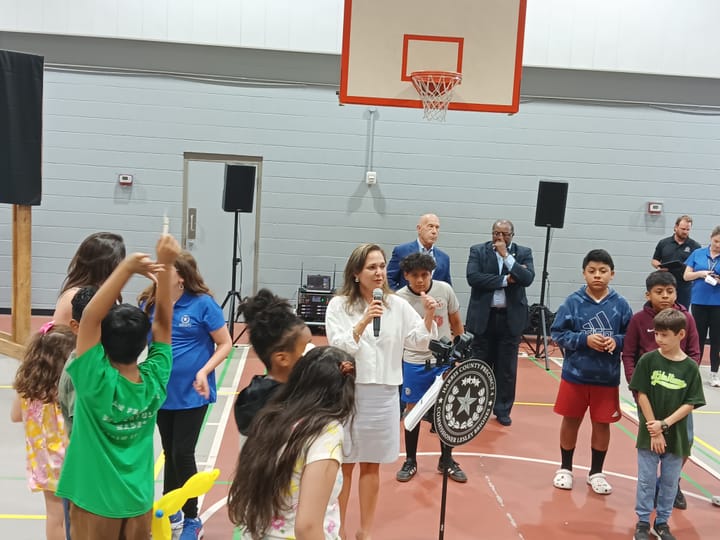How to Educate Kids, according to HISD Elementary Principal of the Year Amanda Wingard

Educating students involves dozens of decisions, many of them controversial. In this interview, HISD Elementary Principal of the Year Amanda Wingard weighs in on several hot-button issues:
- Should kids learn to read through phonics (learning how to sound out letters and words) or sight reading (recognizing words through memorization and context clues)?
- How effective are standardized tests?
- Does the public education system encourage “teaching to the test,” and how does that method affect students?
- How can schools assist students who are learning English as a second language?
- When should students be held back a grade or referred to special ed?
- Is it ever okay to give a student a grade lower than a 50?
Wingard heads Neff Elementary, the school she attended as a child, in the diverse neighborhood of Sharpstown. You can read our profile of her here.
Q: What do you think about learning phonics versus sight reading? And which approach do you take? I know that's been a debate recently.
A: As a teacher, I was trained on sight reading and cueing and kids using context and clues to learn to read. And [I] just finished a a podcast called Sold a Story, where they basically prove that that is not the right way to teach reading and that we really should be leaning on phonics and sounds and blending and orthographic patterns and all of those things.
We really did here, for the last few years, do a mix…but we're really going to make sure that we are tightening back up into our Science of Teaching Reading, which does heavily focus on phonics and letter sounds. And then we're actually adopting a new curriculum that aligns with that. So it's actually starting this year… It's interesting you ask that because I've been really reflective [on] that specific topic the last couple of weeks.
And I think everyone's starting to shift to the Science of Teaching Reading, which is phonics based. I know in Texas—I can't speak for other states—all kinder through third grade teachers are required to pass a Science of Teaching Reading test…
Q: What's the new curriculum?
A: We're going to be using Amplify…which is one that TEA has really been behind in support of.
Q: What was the most convincing part of the case that we should be doing phonics instead?
A: …We have to teach kids how to read, not what to read. And we have to make sure they have the right signals and the right clues to be able to determine what a word is if they don't have pictures, and if they don't have context…, and if they're reading a book that doesn't have the patterns and those type of things...
Q (added later for clarity): What is guided reading, and how does it relate to the phonics versus sight reading debate?
A: So guided reading is very aligned with the sight words and cueing strategy, because you pull kids who are on the same reading level, and a book, and just kind of read it with them, and you guide them through it, and you preview the book and preview the pictures…
And I think some teachers did do phonics instruction through those lessons. But again, more research is coming out that having explicit direct instruction on phonics and reading is more beneficial than pulling all these small groups everywhere. But…when I started teaching, doing whole group instruction very explicitly was a big “No-no.” It was “Let's do workstations. Let's get kids in small groups.”
So we're swinging back, after research and observation over these last years, to [the idea] that explicit phonics and reading instruction is really important...
Q: How effective do you think standardized tests are?
A: I am not against accountability and doing standardized tests, and I definitely think there's a place for it. But I think that there’s too much emphasis placed on it.
Q: What do you think would be a better thing to emphasize instead?
A: …I can say that I think there’s too big of an emphasis on it, but I don’t really have an answer to [that]. And then the current system that we’re working under is very confusing.
Q: How so?
A: We could talk about this for hours…
There’s just a lot of different components…that make it very hard to explain it to our parents…and for kiddos.
[I know a student who] took his first STAAR test this year in reading and math, and he did okay in math, but his reading percentage was low. But he’s a strong reader—he’s on grade level—but when you look at his percentage, you would be like “He’s not on grade level.” So the level that we’re testing kids on a STAAR test, for me, is much harder and much higher than what they should be doing…
Q: When you said the system is confusing, you mean the TEA and all the regulations?
A: And all the components of determining what your accountability [rating] is. And then this year’s going to be even more confusing because last year’s scores were really inflated because the kids…scored really low two years ago, because that was the year that was COVID and we were in-person hybrid, so kids made a lot of growth and did really well from that year to last year. But now this year, not as much growth is going to happen, and [the test] was all online, and they adjusted the test to make it more interactive. So kids had to type responses…
Those are all the outlying factors we have to think about that have really nothing to do with how a kid is doing academically.
Q: So now the test is still going to have an online component?
A: Moving forward, all kids will test online.
Q: Okay, and they’ll have to write stuff for it?
A: Type in with open-ended responses.
Q: Some of my teacher friends worry that the emphasis on standardized tests leads people to “teach to the test,” and that sometimes teaching what helps on the test isn’t always…what students actually need. What do you think about that?
A: …You do want to expose the kids to problems and what they will see when they are being tested on a standardized assessment, but it’s not the be-all-end-all. You want to make sure they’re critical thinkers and that they can share with each other and think past what is on a standardized assessment. So it’s hard…to find a balance.
Q: What kinds of things do you have your teachers do to try find a balance?
A: We make sure that, for instance, our daily assessments and our weekly assessments are aligned with what they’ll see on the STAAR test, so…what we take grades on [is] similar to how things are worded and looked at on the STAAR test. So then we’ll take that data and…see how kiddos did and have discussions about why they did really well or maybe not so well, and we do that on a weekly basis…
But again, we’re not doing STAAR passages every day. We want to make sure we’re exposing them to authentic texts and different types of texts. It’s not “Let me answer this and let me ask you a question and choose a multiple question answer every time.” We want to make sure we’re doing lots of open-ended. But when they’re actually assessed for a grade or assessed to see if they know the material, we’ll use aligned questions…
[But] I don’t want to walk into a classroom and just see that they’re doing a STAAR passage and multiple-choice questions. I want to make sure that they’re reading authentic texts…and speaking to each other with questions, or writing answers and helping them solve and collaborating and doing all of those best practices, versus walking in and seeing a passage and multiple choice questions and that’s what you do all day every day. Because that was happening, and that’s kind of the version of teaching to the test that you’ve heard about.
Q: What issues do you think [teaching to the test] causes?
A: It’s just not best practice because it doesn’t give kids exposure…to different types of learning. You do the same thing every day. And for those that are struggling with learning, whatever the text or objective, you need to expose them to it in different ways…
Q: When is it okay to give a D or F to a kid?
A: …We struggle with that here, again, especially because of our EL [English Language learner] population, because a lot of our kids are going to score low, and not because they don’t necessarily know the content…they’re just really struggling with the language development of English…
So we really focus here on progress… So if a fourth grader comes in, and...they’re reading at a second grade level, if they’ve made progress and moved to a third grade level, but they aren’t necessarily reading on [a fourth] grade level, we still call that a success. And that’s really what we look at here: “Are they making progress in their second language?” Because that’s the majority of our population.
Q: What about if a student just doesn’t make progress?
A: We have systems in place—we call it our intervention assistance team—so that teachers and one of my staff members will meet and say “Hey, what’s going on?”, try to identify what the problem is, maybe put some interventions in place, see if we can get them pulled up. And if we can’t, then that is when we look at doing either a retention [holding them back a grade] or maybe a referral [to special ed] for students…
But again, that’s very tricky here because of our kiddos. We really have to decipher whether we think it’s a language [issue] and they really just need more time in the English language, or not.
Q: So…is the mindset “Avoid giving students Ds and Fs at all costs”?
A: No. What we really want to try to do, though, is avoid giving a kid a 30, because once you give a kiddo that low of a grade, there is no coming back from that, even if they move up to a 90, practically…
I can’t necessarily require that of my teachers, but [we have] those conversations around “If you give a kiddo a 30 in the first six weeks, what will it take to raise that grade to even be passing?”—and it’s too much. And so it’s just exposing teachers [to these ideas]—because I technically can’t tell them, “Don’t give a kiddo a 30.” That’s not within my purview to do.
But one thing we do have to do…is that if a student does get a 30…we have to reteach and give them a chance to retake it, and that is state policy. You just don’t want to punish kiddos for taking longer than others to learn the material, because that happens quite a bit.
Q: So if a student gets far behind, they have a chance to retake. What if they never catch up to where they were supposed to be originally? What if they end up passing things but they just stay behind?
A: Again, that’s something we would look at by kiddo or by student and then meet…with the intervention team and kind of make a decision on what the best path or the best next step for that student is.
Q: So you’re more in favor of the “minimum 50” policy? [Giving students no less than a 50 on graded assignments.]
A: Mmmhm.
Q: What if a student just doesn’t turn anything in at all?
A: That’s when we follow up with parents, have conversations, involve our counselor. Every kid is so different. But it is not okay to put a zero for no-turned-in work. And we don’t have that issue here as much in elementary school as I think that they struggle with [it] in middle school or high school. I’m not saying it never happens, but it’s not a prevalent issue we’ve ever had to address.
Q: How does your Christianity relate to education? [Wingard attends Westbury Church of Christ.]
A: …I guess that’s part of why I became a teacher too, because I wanted whatever I did for my professional work and to support my family to feel like it had a purpose and had meaning. And it’s really, really hard work, but it’s worth it because of the work that we do with kids…giving them support, not just academically but socially and emotionally too.
We have deleted filler words, removed other phrases and sentences for brevity (marked by "..."), edited for grammar, and inserted or changed words for clarity (marked by "[ ]"). The order of some questions has been changed. In every instance, we have sought to be entirely faithful to the meaning of the original.
Correction: We fixed several embarrassing spelling and grammar mistakes on July 6, 2023. Those mistakes were the responsibility of the Sharpener's editor-in-chief, Tyess Korsmo.




Comments ()